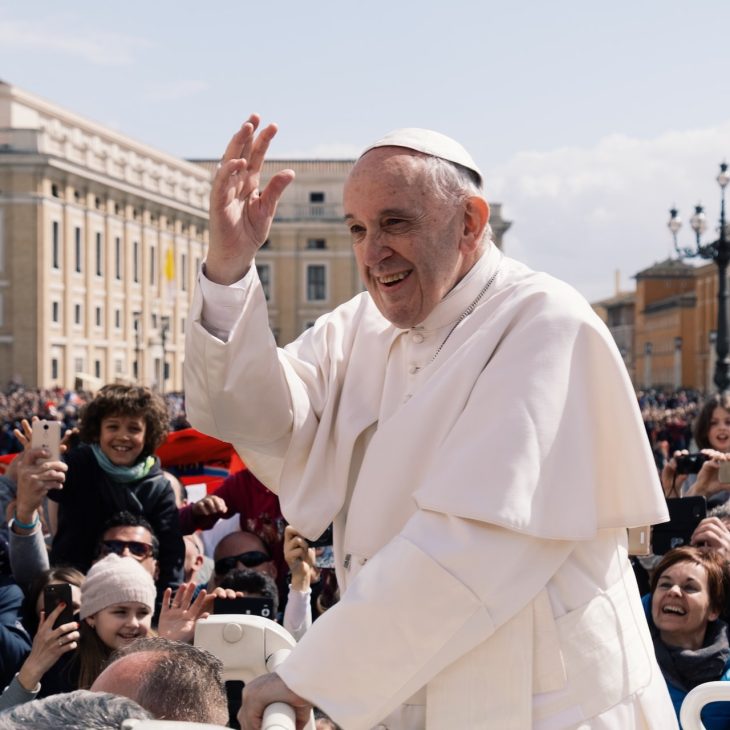Pope Francis Renews Call for Interfaith Solidarity
October 26, 2020

A few weeks ago, Pope Francis released a new encyclical, Fratelli Tutti (“Brothers and Sisters All”), directing attention to the loneliness, insecurity, and fear causing widespread distrust and division around the globe. Francis appeals to us to “dream together” (no. 8) as members of a “single-family dwelling in a common home” (no. 17) about how to build a “community of belonging and solidarity” (no. 36). By repeatedly calling on the power of dreams, Francis invites us to tap into our deepest desires for ourselves and each other. To dream together is to stretch our imagination of what is possible, to shift our attention from the world as it is to the world we long to be made by “loving and accepting all our brothers and sisters” (no 86).
While the encyclical repeats familiar themes from throughout Francis’ papacy (e.g., the primacy of mercy, the need to accompany those on the margins, and the urgency of working for the global common good), it focuses, especially on inclusion and interdependence. Fratelli Tutti acknowledges that, in the face of the COVID-19 pandemic and a world on the brink, “no one is saved alone; we can only be saved together” (no. 32). In the midst of so much us-versus-them tribalism, the pope urges us to move beyond our usual routines and comfortable relationships. Nothing changes if nothing changes.
What will inspire us to change? Francis invokes the example of the Good Samaritan (Luke 10:25-37), as modeling the kind of courage, compassion, and boundary-breaking solidarity our world needs right now. Francis reflects that every “day we have to decide whether to be Good Samaritans or indifferent bystanders.” Even more than this, however, the pope encourages us to consider how, over time, “all of us are, or have been, as each of the characters in the parable. All of us have in ourselves something of the wounded man, something of the robber, something of the passers-by, and something of the Good Samaritan” (no. 69). This is not just a story about doing a good deed; it challenges us to reevaluate how we understand who belongs, who counts, who matters – and who can make claims on us. The parable’s parting words, “Go and do likewise,” admonish us to go out of our way and into the ditch and take a vantage point other than our own. Where we stand—and with whom—changes what we see, think, and feel, which can also make a difference for what we say and do.
In contrast to typical encyclicals that impose universal principles from the top-down, Fratelli Tutti stresses the need to “start from below, and case by case, act at the most concrete and local levels, and then expand to the farthest reaches of our countries and our world, with the same care and concern that the Samaritan showed” (no. 78). The pope reminds us that individual beliefs and actions affect others and shape cultural norms; he calls on us to be agents of hope and healing in a wounded world.
The final chapter of Fratelli Tutti is dedicated to interfaith solidarity. Francis cites his relationship with Grand Imam Ahmad Al-Tayyeb and their fruitful exchanges as allies aiming to “spread the culture of tolerance and of living together in peace” (no. 192). Both religious leaders affirm that “religions must never incite war, hateful attitudes, hostility and extremism, nor must they incite violence or the shedding of blood. These tragic realities are the consequence of a deviation from religious teachings. They result from political manipulation of religions” (no. 285). When we encounter and accompany people of other faith traditions, we help extend God’s welcome to all. Even more, many of us are changed through these experiences and relationships.
Francis calls on all people of faith to practice interfaith dialogue, friendship, and collaboration. Dialogue humanizes the other, it employs both respect and humility through a willingness to listen and learn from the other. Robust dialogue helps us practice “reciprocity and mutual enrichment” in seeking a deeper grasp of reality, exploring the common ground, and promoting the common good (no. 103).
But dialogue must be more than sharing beliefs, values, and experiences. The pope quotes bishops of India in asserting, “the goal of dialogue is to establish a friendship, peace, and harmony, and to share spiritual and moral values and experiences in the spirit of truth and love” (no. 271). When dialogue is seen as a pathway to friendship, it strives to create the conditions for people to feel safe enough to be vulnerable and forge trust through mutual respect and co-responsibility. Interfaith sharing shifts from something we do to who we are: we become friends who care about each other such that their problems become our problems.
Importantly, however, dialogue and friendship lead us still farther: to organizing and empowerment manifest through collaboration. We are not mere allies who opt-in or opt-out at will; we are partners in a mission intending to push deeper into Holy Mystery, our common Source, and Destiny, in whose image we are all made. We are pilgrims on a journey together, not just praying for peace but laboring as an “artisan for peace” by investing ourselves in curiosity, generosity, and tenderness that help us share life together through the highs and lows (no. 284). Taking up these gifts and tasks as people of faith with our eyes fixed on solidarity, we can rely on each other for support and accountability and refuse to settle for something less than what God can make possible in and through us.
Marcus Mescher is an associate professor of Christian ethics at Xavier University in Cincinnati, OH. He specializes in Catholic social teaching and moral formation and he is the author of The Ethics of Encounter: Christian Neighbor Love as a Practice of Solidarity (Orbis, 2020).
Share
Related Articles



